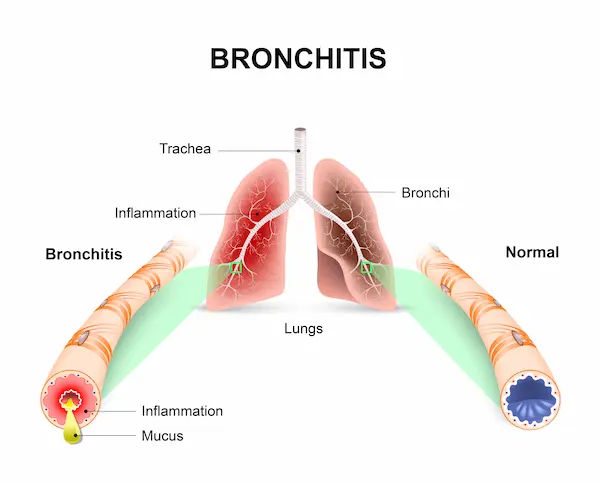Asthmatic Bronchitis Overview and Management
Learn about asthmatic bronchitis, a condition combining symptoms of asthma and bronchitis. Discover its causes, symptoms, and effective management strategies to improve respiratory health.

Written by Dr. Vasanthasree Nair
Reviewed by Dr. Mohammed Kamran MBBS, FIDM
Last updated on 26th Aug, 2025

Asthmatic bronchitis is a condition that affects the airways, making it difficult to breathe. It combines symptoms of both asthma and bronchitis, leading to coughing, wheezing, and shortness of breath. If you or a loved one is dealing with this condition, understanding its causes, symptoms, and management can help improve quality of life.
What is Asthmatic Bronchitis?
Asthmatic bronchitis occurs when the bronchial tubes (airways in the lungs) become inflamed due to an asthma-related reaction or respiratory infection. This inflammation leads to:
- Excess mucus production
- Narrowing of airways
- Difficulty breathing
Unlike regular bronchitis, which is often caused by infections, asthmatic bronchitis is triggered by asthma-related factors like allergies, pollution, or irritants.
Consult a Top Pulmonologist
Symptoms of Asthmatic Bronchitis
The symptoms can vary from mild to severe and may include:
- Persistent cough (with or without mucus)
- Wheezing (a whistling sound while breathing)
- Shortness of breath
- Chest tightness or discomfort
- Fatigue (due to difficulty breathing)
- Increased symptoms at night or early morning
If these symptoms worsen or do not improve with usual medications, seek medical help immediately.
Causes and Triggers
Several factors can trigger asthmatic bronchitis, including:
- Allergens (dust mites, pollen, pet dander)
- Respiratory infections (cold, flu, sinus infections)
- Air pollution & smoke (cigarette smoke, vehicle fumes)
- Cold air or sudden weather changes
- Strong odors or chemical fumes (perfumes, cleaning products)
- Physical exertion (exercise-induced asthma)
Identifying and avoiding these triggers can help prevent flare-ups.
How Asthmatic Bronchitis Affects Health
If not managed properly, asthmatic bronchitis can lead to:
- Frequent respiratory infections
- Reduced lung function over time
- Sleep disturbances due to nighttime coughing
- Difficulty in performing daily activities
However, with proper care, most people can lead an active and healthy life.
Management and Treatment
Below are the details regarding management and treatment of asthmatic bronchitis,
1. Medications
Doctors may prescribe:
- Bronchodilators (inhalers that open airways)
- Steroids (to reduce inflammation)
- Antihistamines (if allergies are a trigger)
- Mucolytics (to loosen mucus)
Always follow your doctor’s prescription and avoid self-medication.
2. Lifestyle Changes
- Avoid smoking and secondhand smoke.
- Use air purifiers to reduce indoor allergens.
- Stay hydrated to keep mucus thin.
- Exercise regularly (but avoid outdoor workouts in polluted or cold air).
- Practice breathing exercises (like pursed-lip breathing) to improve lung function.
3. Home Remedies for Relief
- Steam inhalation helps loosen mucus.
- Warm fluids (herbal teas, soups) soothe the throat.
- Honey and ginger can ease coughing (avoid honey for children under 1 year).
4. When to See a Doctor
Consult a doctor if:
- Symptoms worsen despite medication.
- You experience high fever, bluish lips, or extreme difficulty breathing.
- You need help creating an asthma action plan.
Prevention Tips
Below are a few prevention tips,
- Get vaccinated (flu and pneumonia shots can help).
- Monitor air quality and stay indoors on high-pollution days.
- Keep your living space clean (dust-free, mold-free).
- Wear a mask in polluted or cold environments.
Need Expert Help?
If you're struggling with persistent breathing issues, Apollo 24|7 offers expert consultations and diagnostic tests to help manage asthmatic bronchitis effectively. You can book an appointment online and get personalized care from the comfort of your home.
Final Thoughts
Asthmatic bronchitis can be challenging, but with the right treatment and lifestyle adjustments, you can control symptoms and stay active. Pay attention to triggers, follow your doctor’s advice, and take preventive measures to breathe easier.
Consult a Top Pulmonologist
Consult a Top Pulmonologist

Dr. P Sravani
Pulmonology Respiratory Medicine Specialist
3 Years • MBBS, MD
Visakhapatnam
Apollo Clinic Vizag, Visakhapatnam

Dr. Hyder
Pulmonology Respiratory Medicine Specialist
5 Years • MBBS, MD (PULMONOLOGY)
Guntur
Kalam chest and multi-speciality clinic, Guntur

Dr. K Prasanna Kumar Reddy
Pulmonology Respiratory Medicine Specialist
16 Years • MBBS, DTCD (TB&CHEST), DNB (PULM MED), FCCP
Hyderabad
Apollo Medical Centre Kondapur, Hyderabad

Dr. E Prabhakar Sastry
General Physician/ Internal Medicine Specialist
40 Years • MD(Internal Medicine)
Manikonda Jagir
Apollo Clinic, Manikonda, Manikonda Jagir
(125+ Patients)

Dr. R. Nithiyanandan
Pulmonology/critical Care Specialist
6 Years • MBBS, MD Internal Medicine , DM Pulmonary and critical care medicine
Chennai
Apollo Hospitals Greams Road, Chennai
(25+ Patients)
Consult a Top Pulmonologist

Dr. P Sravani
Pulmonology Respiratory Medicine Specialist
3 Years • MBBS, MD
Visakhapatnam
Apollo Clinic Vizag, Visakhapatnam

Dr. Hyder
Pulmonology Respiratory Medicine Specialist
5 Years • MBBS, MD (PULMONOLOGY)
Guntur
Kalam chest and multi-speciality clinic, Guntur

Dr. K Prasanna Kumar Reddy
Pulmonology Respiratory Medicine Specialist
16 Years • MBBS, DTCD (TB&CHEST), DNB (PULM MED), FCCP
Hyderabad
Apollo Medical Centre Kondapur, Hyderabad

Dr. E Prabhakar Sastry
General Physician/ Internal Medicine Specialist
40 Years • MD(Internal Medicine)
Manikonda Jagir
Apollo Clinic, Manikonda, Manikonda Jagir
(125+ Patients)

Dr. R. Nithiyanandan
Pulmonology/critical Care Specialist
6 Years • MBBS, MD Internal Medicine , DM Pulmonary and critical care medicine
Chennai
Apollo Hospitals Greams Road, Chennai
(25+ Patients)




